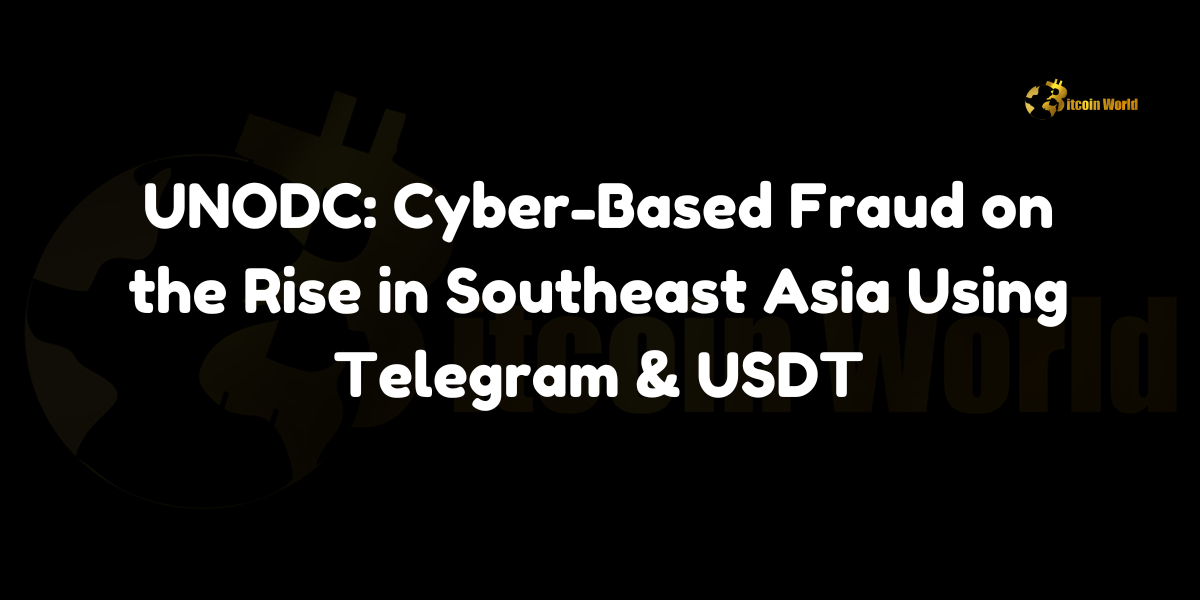UNODC: Cyber-Based Fraud on the Rise in Southeast Asia Using Telegram & USDT
In a concerning development for digital security, the United Nations Office on Drugs and Crime (UNODC) has reported a significant increase in cyber-based fraud across Southeast Asia. According to a recent report highlighted by Cointelegraph, the financial damages from such fraudulent activities are estimated to range between $18-$37 billion for the year 2023. The report attributes the surge in fraud primarily to organized crime groups exploiting modern communication platforms and stablecoins like USDT.
Surge in Cyber-Based Fraud in Southeast Asia
The UNODC’s latest report sheds light on the escalating trend of cyber-based fraud in Southeast Asia, a region increasingly targeted by sophisticated criminal networks. The estimated financial losses, ranging from $18-$37 billion in 2023 alone, underscore the urgent need for enhanced cybersecurity measures and regulatory frameworks to combat these illicit activities.
Organized Crime Driving Fraudulent Activities
A significant portion of the reported fraud is believed to be orchestrated by organized crime syndicates. These groups leverage advanced technological tools and strategies to execute large-scale fraudulent schemes, making it challenging for authorities to track and mitigate their operations effectively. The use of organized structures allows for coordinated attacks, higher efficiency in executing frauds, and better evasion of law enforcement efforts.
Shift to Telegram for Crime-Related Data Exchange
The UNODC report highlights a disturbing trend where the market for crime-related data is increasingly migrating to Telegram, a popular messaging app known for its encrypted communication capabilities. Telegram provides a secure and private platform for criminal organizations to share information, plan fraudulent activities, and coordinate their operations without easy detection by authorities. The anonymity and encryption features of Telegram make it an attractive choice for illicit activities, complicating efforts to monitor and control cyber-based fraud.
Stablecoins and USDT Preferred by Criminal Organizations
In addition to communication platforms, the report points out that stablecoins, particularly Tron (TRX)-based Tether (USDT), are the preferred digital assets for criminal organizations involved in cyber-based fraud. USDT offers the stability of traditional fiat currencies while maintaining the ease of digital transactions, making it an ideal choice for laundering money and conducting large-scale fraudulent activities. The decentralized nature of stablecoins further aids criminals in avoiding regulatory scrutiny and facilitating seamless cross-border transactions.
Implications for Law Enforcement and Regulatory Bodies
The rise in cyber-based fraud using platforms like Telegram and stablecoins such as USDT presents significant challenges for law enforcement agencies and regulatory bodies in Southeast Asia. Traditional methods of monitoring and intercepting fraudulent activities are proving inadequate against the sophisticated techniques employed by organized crime. The UNODC emphasizes the need for international cooperation, advanced technological solutions, and robust regulatory frameworks to address these emerging threats effectively.
Strategies to Combat Cyber-Based Fraud
To counter the growing threat of cyber-based fraud, the UNODC recommends several strategies:
- Enhanced Cybersecurity Measures: Implementing advanced cybersecurity protocols and technologies to detect and prevent fraudulent activities.
- Regulatory Frameworks for Stablecoins: Developing comprehensive regulations for the use and exchange of stablecoins to reduce their misuse by criminal organizations.
- International Cooperation: Fostering collaboration between countries to share intelligence, coordinate law enforcement efforts, and tackle cyber-based fraud on a global scale.
- Public Awareness Campaigns: Educating the public and businesses about the risks of cyber-based fraud and promoting best practices for digital security.
Future Outlook
As technology continues to evolve, so do the methods employed by cybercriminals. The UNODC warns that without decisive action, the financial impact of cyber-based fraud in Southeast Asia is likely to increase, posing significant risks to both the digital economy and the financial stability of the region. Proactive measures and sustained efforts are essential to mitigate the rise of organized cybercrime and protect the integrity of digital financial systems.
Conclusion
The UNODC’s report on the rise of cyber-based fraud in Southeast Asia serves as a stark reminder of the evolving threats posed by organized crime in the digital age. The exploitation of platforms like Telegram and stablecoins such as USDT underscores the need for enhanced regulatory measures, advanced cybersecurity technologies, and international cooperation to effectively combat these illicit activities. As Southeast Asia grapples with this surge in fraud, the implementation of comprehensive strategies will be crucial in safeguarding the region’s economic and digital infrastructure.
Disclaimer: The information provided is not trading advice, Bitcoinworld.co.in holds no liability for any investments made based on the information provided on this page. We strongly recommend independent research and/or consultation with a qualified professional before making any investment decisions.




